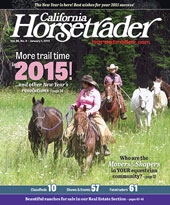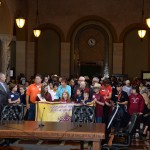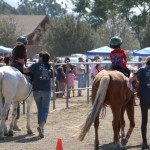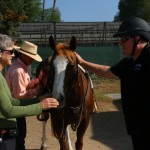 When Lynn Brown first took to the Griffith trails on horseback, the daughter of a Texas rancher saw a piece of half-buried steel rebar sticking up from the path, and she called the City of Los Angeles. They fixed it.
When Lynn Brown first took to the Griffith trails on horseback, the daughter of a Texas rancher saw a piece of half-buried steel rebar sticking up from the path, and she called the City of Los Angeles. They fixed it.
Twenty years later, Brown remains vigilant – and effective. Her view has expanded beyond her beloved local trails, as she now is Vice President of the Los Angeles Equine Advisory Committee, an official City advisory body she helped launch in 2009 that reports directly to the 15 L.A. council members.
Entering its seventh year, the EAC has an impressive achievement list on behalf of equestrians, from protecting vast city horse trails to fending off extreme activists attempting end-runs to squelch horse ownership. Tireless campaigns by Brown and her colleagues have provided insights, none greater than the importance of positive community involvement.
“A lot of what we have achieved has been through working with city council and city government,” she says, “as opposed to against them.”

Horse advocate Lynn Brown (center, in blue) joins L.A. Councilmember Tom LaBonge (second from far left) and more than 100 riders from 17 organizations in the city’s official Day Of The Horse ceremony last October at City Hall. The annual event, sparked by the volunteer L.A. Equine Advisory Committee, reminds civic leaders of the importance of horses in the great city.
“A developer drives by and sees a couple of horses standing out in a field and immediately thinks, ‘Why would you have some dusty animals in that field, when we could put in 160 condos?’,” Brown says. “And if there is a trail issue, or a zoning issue, if it’s just equestrians who are concerned, it is easy to be written off as ‘special interest’ people. If it is a broad coalition of various users who are all concerned about the same issue, it carries much more clout.”
When a well-organized mountain bike coalition pushed L.A. to reopen City trails to the bikers, the EAC reached out to other non-equestrian trail users to join Brown and her colleagues to suppress the challenge. The strategy worked, keeping trails for hikers and horses.
“If it’s the horsepeople, the mommy strollers, the dog-lovers, the Audubon Society, then it becomes a powerful voice,” she says.
Brown urges major equestrian groups to reach out to their local city councils and to establish a rapport between the bureaucrats and local horse people. In addition, she also advocates for equestrians to reach beyond horse groups to form alliances with other trail users such as running clubs, Sierra Club, hikers in general, dog walkers, home owner associations and conservationists who also love and use the trails/open spaces.
“I did not include mountain bikers,” she says, “because their sport, as practiced, is not compatible with other, slower-moving trail users.”
When equestrians hold a barbecue or other social event, Brown suggests inviting local city council persons or other concerned open space/trail people to join the gathering.

Exposing non-horse people in the community with the equestrians is important, says Patty Morton of the Twin Oaks Valley Equestrian Association in San Marcos. At the Horse Heritage Festival, horse groups come together to share — and demonstrate — their passion.
“Provide a welcome mat to city council or other concerned folk,” she adds. “Provide them with a horse to ride, a barbecue to attend and a photo op, and they’ll most likely show up. Once the bureaucrats can put face on a group, you are more likely to get cooperation from their office for your issues.”
Brown says her greatest contribution may be an ability to pull horsepeople together and move them forward as a body. It can be challenging, though.
Once, after speaking to a large group of equestrians, a woman came up to her to say she was retired, didn’t want to go to the effort of going to city hall, or contacting other concerned non-equestrians.
“She said she knew she should do those things, but she said, too, that she just wanted to be left alone and ride her horse,” Brown says. “I told her that I completely understood — I just want to ride my horse, too. But without involvement with bureaucrats and other groups, pretty soon equestrians will not have a safe place to ride their horse. They’ll be crowded onto dangerous trails, or zoned out of existence entirely.”
Uniting the diverse factions of the equestrian world can be challenging, too.
“In the horse world, our weakest point is the fighting between disciplines and breeds,” she says. “My joke is that the Quarter Horse people don’t speak to the jumping horse people and the trail horse people don’t speak to the dressage people and nobody speaks to the Arab horse people at all. And nobody talks to the mule people, either.”
“There’s a tremendous snobbery — instead of recognizing that they are all equines,” she adds. “The fact is, we all love our horses. It doesn’t matter whether you ride English or Western or get pulled by a cart. It doesn’t matter. The snobbery and the in-bred fighting where horse people defeat themselves over and over again. Equestrians shoot themselves in the foot all the time.”

Trainer Patty Morton (front left), along with fellow San Marcos trainer Robin Bond, prepare a horse for San Marcos Director of Community Services, Buck Martin, before heading out on a ride along city trails.
“Most of us don’t know what the horse industry contributes to the national economy – we need to get this info out to the city and local bureaucracies,” Brown says.
Another passionate community horse advocate is Patty Morton, a hunter-jumper trainer in San Marcos who runs the Twin Oaks Valley Equestrian Association. Though of much smaller scale than the EAC, TOVEA faces similar issues. Surmounting them in pursuit of future horse generations requires vigilance, organization and teamwork.
“For me personally, it’s a bit of a marathon,” laughs Morton, who moved from La Jolla Farms to the Twin Oaks Valley in 1984 to work with Diane Grod. Four years later, she acquired her own four-acre facility, Pathfinder Farm, that has been home since.
She was recruited to the initial TOVEA board by founders Sarah Baldwin and Carol Shuttleworth in the 1990s, when the pressing issue with developers was the continuity of a trail system. Land use and zoning vigilance remain, but TOVEA has also evolved into a rich unification of diverse equine disciplines. And, a bridge for the non-horse community to experience horses.
“I enjoy it. It is like a part-time job for me — a volunteer job, obviously — but I really enjoy it,” she says. “I’m always trying to figure out a way to have what we are doing here to be sustainable. I don’t want it to go on for 10 years and then fizzle out. I want it to go on, draw people in, and get the energy to keep it going.”
Morton will tell you she relies on skills of others “who do things better than I do,” but her recruiting skills have brought the area’s talented professionals together. Two annual events, the Common Ground Clinic in spring and the Horse Heritage Festival in the fall, are hugely popular.
The Common Ground Clinic brings trainers from three disciplines together, and participants are encouraged to ride outside their normal events. The Horse Heritage Festival is a bridge between the horse community and the non-horse community, where many locals ride a horse for the first time, assisted by local professionals and their students.
“People are drawn to horses,” Morton says. “And so many people don’t have the opportunity to be around them. They are fascinated by them, in awe, but they don’t have the opportunity. Over the years, we have geared this event to allow the community population to interact with our horses.”
“We try to really bring in the educational side of the process,” she adds. “We’ve got the farriers and the veterinarias. The FFA kids are involved, the therapeutic riding program – people get to see how multi-dimensional these animals are, and that they are accessible – a person doesn’t have to be rich. They can get involved with these horses at many different levels, and the horses will give back so much.”
“It charges your battery,” she admits. “When you’re out there and you have a kid on a pony for the very first time, it just makes everything so worthwhile. It feeds the soul.”
Along with the popular spring Common Ground Clinic and the autumn Horse Heritage Festival, Morton and TOVEA are looking in 2015 at organizational opportunities involving conservancy.
MORE ONLINE: http://bit.ly/501A_TOVEA and at http://bit.ly/501A_EAC
Leave a Comment
All fields must be filled in to leave a message.